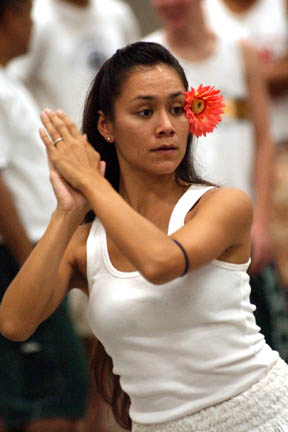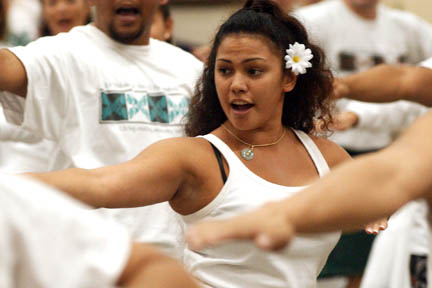
|
Hawaiian Idol
Maile Francisco follows
in her friends’, and former
Miss Aloha Hulas’, steps
If Sonny Ching had noticed that Easter and the Merrie Monarch Festival were arriving earlier than usual in 2005 there would have been no Christmas concerts this year for the 200-plus members of his Halau Na Mamo O Pu'uanahulu. They'd already be preparing for the hula festival competition.
But, Ching says, he "wasn't paying attention," and because proceeds from the halau's earlier shows have helped local charities, Ching and his halau are continuing the holiday tradition.
The halau will present a new Christmas production, "Immersed in the Bowl of Light," at Hawaii Theatre tomorrow and Sunday.
In ConcertSonny Ching and Halau Na Mamo O Pu'uanahulu:Where: Hawaii Theatre When: 7 p.m. tomorrow and 3 p.m. Sunday Tickets: $20 to $30 Call: 528-0506 or visit www.hawaiitheatre.com
|
Francisco, who took up hula at age 4 and joined the halau at 13, says there's considerable pressure and public scrutiny that comes with representing a halau that has produced Miss Aloha Hula winners two years in a row.
"A lot of people have been watching me since kumu announced my name, so I have to be careful about what I do or say.
"That is a lot of pressure, but I think I can handle it. I'm not worried about people I don't know. It's the people that I do know that I'm worried about," she said during a recent rehearsal, trying to explain how people who appear to be friendly can have hidden agendas or resentments.
"I've been dancing hula since I was 4, so pretty much it's my life," she said, adding that she also enjoys cooking, singing "socially," and that Oyama and Akau are her best friends.
"We've grown up with each other for 10 years, and that kind of bond is pretty special. ... It helps me out a lot."
Akau, who had a similar experience after she was named as the halau's representative for the 2004 competition, says the scrutiny is just something you live with and get past.
"People kept asking me (before Merrie Monarch 2004) how I was feeling about being next ... and following in (Jennifer's) footsteps, but I tried not to let that overcome me, because I knew it would be one of my downfalls (and) one of the things that would hold me back from being myself," Akau said.
"Surprisingly (that) didn't pressure me. If anything, I was just myself. Now that I think about it, it was kind of scary 'cause I wasn't nervous ... when I go out in a group I'm still a little nervous ... but I think I was so prepared, I was just so calm and so relaxed and that was the only thing that scared me."

Kumu hula Sonny Ching works with Natasha Akau for her part in the Halau Na Mamo O Pu'uanahulu's Christmas concert.
"I told both these girls the same thing: You don't need to win this to know that you're a good dancer. They're good, that's why I selected them, and they're also competing against 12 to 16 other girls that obviously have some kind of technical skills, some kind of ability, and that's why they were selected to represent their halau.
"One of the difficult things about competing within a cultural art form is finding that balance of how much of it is competition and how much of it is perpetuating and showcasing the culture. That's one of the things that I really, really try to instill within my students.
"Even though it is a competition, we're going to show what it is that we do as a halau, and we want to put forth the best possible performance that we as humans can possibly do. If it wins, great. If it doesn't that's OK too, as long as we know that we did everything we possibly could to make that particular song or chant dance live. The key is making the mele live, and if we succeed in that than we really feel OK about our performance."

Although those honored as Miss Aloha Hula in years past haven't gotten the type of mainstream media attention, product endorsements and sponsorships, and other commercial opportunities now being offered to karaoke contest participants and other "instant celebrities," Ching says that's been changing -- in Japan, anyway.
"One of the best markets for Miss Aloha Hula winners is in Japan. One of the things I didn't realize until (Oyama) won is that they become a separate entity. They become little stars in their own right. When (Oyama and Akau) go to Japan, they get a separate contract ... that's one of the good things, I think, that happens. They've been to Japan five times this year."
Akau describes their treatment in Japan as being "like the 'American Idol' thing."
"Pushing and shoving. 'We want your autograph.' 'Picture, please.' You don't get that down here in Hawaii. Sometimes I think it's because there are so many of us here who practice hula that even if we have won a title we're still trying to do the same thing, which is to perpetuate our Hawaiian culture."
Ching adds, "I think it's a little shameful that there is that tendency to take (hula) for granted and that's one of the reasons that I enjoy teaching the Japanese, even though I get criticized for it.
"They don't have (hula) on a daily basis and they appreciate it so much and have such a strong desire to learn more."
Oyama says that although Miss Aloha Hulas don't seem to be considered as role models or spokespeople for public service announcements and the like, the responsibilities and opportunities that come with the title don't evaporate when the annual festival is over.
"The year that I won, I was in Japan maybe twice, and then when Natasha won, the both of us went maybe seven months out of the year. I think you also become more of an idol for everybody else -- the keiki in the halau, other hula dancers who dance alongside of us -- but then too there's that yearning to learn more hula and learn to love the culture even more," she says.

Maile Francisco, the halau's representative for Miss Aloha Hula 2005, says there is a lot of pressure that comes with representing a halau that produced two winners in a row.
www.hawaiitheatre.com
[News] [Business] [Features] [Sports] [Editorial] [Do It Electric!]
[Classified Ads] [Search] [Subscribe] [Info] [Letter to Editor]
[Feedback]
